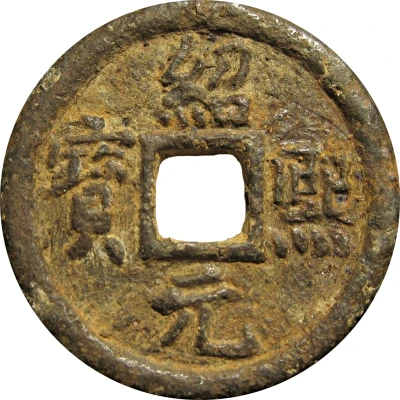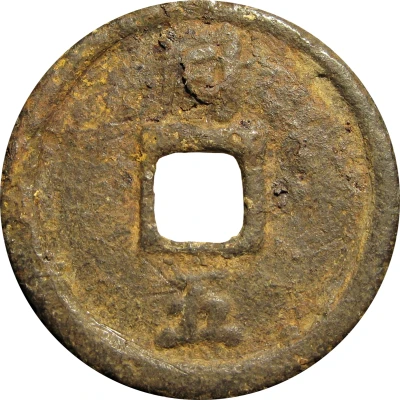


© ollisaarinen (CC BY)
2 Cash - Shaoxi Yuanbao; Regular script; Tong; with year; iron
| Iron | 7.30 g | 29 mm |
| Issuer | Empire of China |
|---|---|
| Emperor | Southern Song dynasty › Guangzong (宋光宗) (1189-1194) |
| Type | Standard circulation coin |
| Years | 1-5 (1190-1194) |
| Calendar | Chinese - Shaoxi era |
| Value | 2 Cash |
| Currency | Cash (621-1912) |
| Composition | Iron |
| Weight | 7.30 g |
| Diameter | 29 mm |
| Thickness | 2.6 mm |
| Shape | Round with a square hole |
| Technique | Cast |
| Orientation | Medal alignment ↑↑ |
| Demonetized | Yes |
| Updated | 2024-10-04 |
| Numista | N#140874 |
|---|---|
| Rarity index | 92% |
Reverse
At least one Chinese ideogram at various locations and one across from it.
Script: Chinese (traditional, regular script)
Lettering:
同
五
Translation:
Tong / Wu
Tong'an (mint) / Year 5
Edge
Plain
Comment
Most years have the Tong above and the year below, with Year 2 being the only exception.Interesting fact
One interesting fact about this coin is that it was made of iron, which was a unusual choice of material for coins at that time, as most coins were made of copper, silver or gold. The use of iron in coinage was seen as a way to reduce the cost of production and make the currency more accessible to the general population. This decision was taken by the government of the Empire of China during the reign of Emperor Guang Zhao, who ruled from 1189 to 1194. The iron coins were minted in large quantities and were widely used in trade and commerce. Despite their durability, the iron coins were not as popular as other metallic coins and were eventually phased out in favor of coins made of other materials.